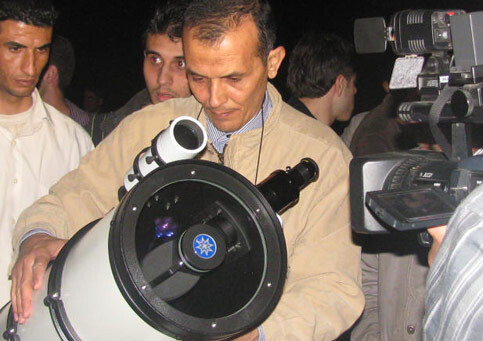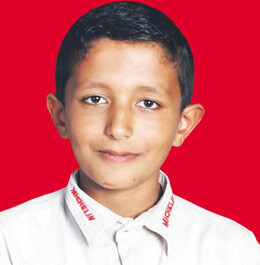The Electronic Intifada 4 May 2010

Suleiman Baraka stargazing in Gaza. (Amjad Hammad)
As the sun set on a clear evening in Gaza City, Suleiman Baraka was setting up his telescope on the rooftop of the French Cultural Center as two dozen visitors waited anxiously to gaze into the stars. It was a rare occasion to break away — at least momentarily — from the siege on the ground in the Gaza Strip.
“It is such an exciting experience for me that I never imagined would happen,” said Suzan al-Barashly, one of the waiting star-gazers. “I’ve been used to nothing but Israeli warplanes and drones buzzing over our heads. I have never enjoyed the beauty of our sky. I am seeing the stars close to me — such a beautiful scene.”
In recent years, the Gaza Strip has witnessed widespread Israeli air raids that targeted many parts of the coastal territory, the latest and deadliest of which was in the winter of 2008-09. More than 1,400 persons, mostly civilians, were killed in the attacks.
That reality was not far from al-Barashly’s mind. “I just told a friend that I am afraid to look into this telescope,” she said. “It resembles a rocket launcher, so I am afraid the Israeli unmanned drones will hit us, thinking we are launching rockets.”
Ahmad, another amateur astronomer, said, “I feel glad to have experienced something that is unimaginable in Gaza. Really, thanks to Mr. Suleiman, who made us enjoy such an incredible moment.”
For the past several weeks, astronomer Suleiman Baraka has been touring the Gaza Strip with his telescope to allow as many individuals as possible to enjoy a few moments looking up into the heavens. His first stop was with the schoolmates of his late son, Ibrahim.

Ibrahim Baraka
“The killing of my son inspired in me a message of peace, a message that I decided to convey to his killers,” Baraka said. “I gathered Ibrahim’s fellow students and started teaching them how to be inspired to be scientists.”
“I didn’t teach them sources of horror or terror,” Baraka recalled. “Rather, I wanted to send out a message that the sky, from which my son was killed, is a beautiful sky that has beautiful things to look at.”
Along with the killing of his son and the destruction of his home, Baraka lost his large library of scientific books. With a smile full of pride, the astronomer also spoke about his experience at NASA.
“Man is great, man can do everything, once he is provided with the tools for creation. When you take off the social or economic burdens that always pose an obstacle in the face of achievement, man can do anything and can reach the moon. The Americans have been successful enough, ensuring such proper conditions for creation.”
Before his position at NASA, Baraka had spent time doing research at Virginia Tech. When he first joined NASA, Baraka said, “I felt so proud of being a part of this prestigious American agency,” he recalled.
Asked whether he planned to stay in Gaza or move abroad, Baraka replied that he is thinking of staying in Gaza to foster research for the benefit of the entire Gaza community.
“In coordination with a local university here, I plan to open up the first-ever space research department, hoping that in a course of five years, Gaza will see several space researchers, God willing,” Baraka said.
But even bringing his highly-advanced Meade LXD 75 telescope into the Gaza Strip was enormously difficult due to the strict blockade Israel has imposed on in the territory for almost three years.
“Three countries helped bring this equipment into Gaza, but I am not going to name any of them,” the astronomer said after an evening of star-gazing. As he spoke, he packed up the telescope, ready for the next stop on his tour.
Due to an editing error, this article originally stated that Suleiman Baraka’s son was 11 when he was killed. This article has been updated with his correct age of 12.
Rami Almeghari is a journalist and university lecturer based in the Gaza Strip.



